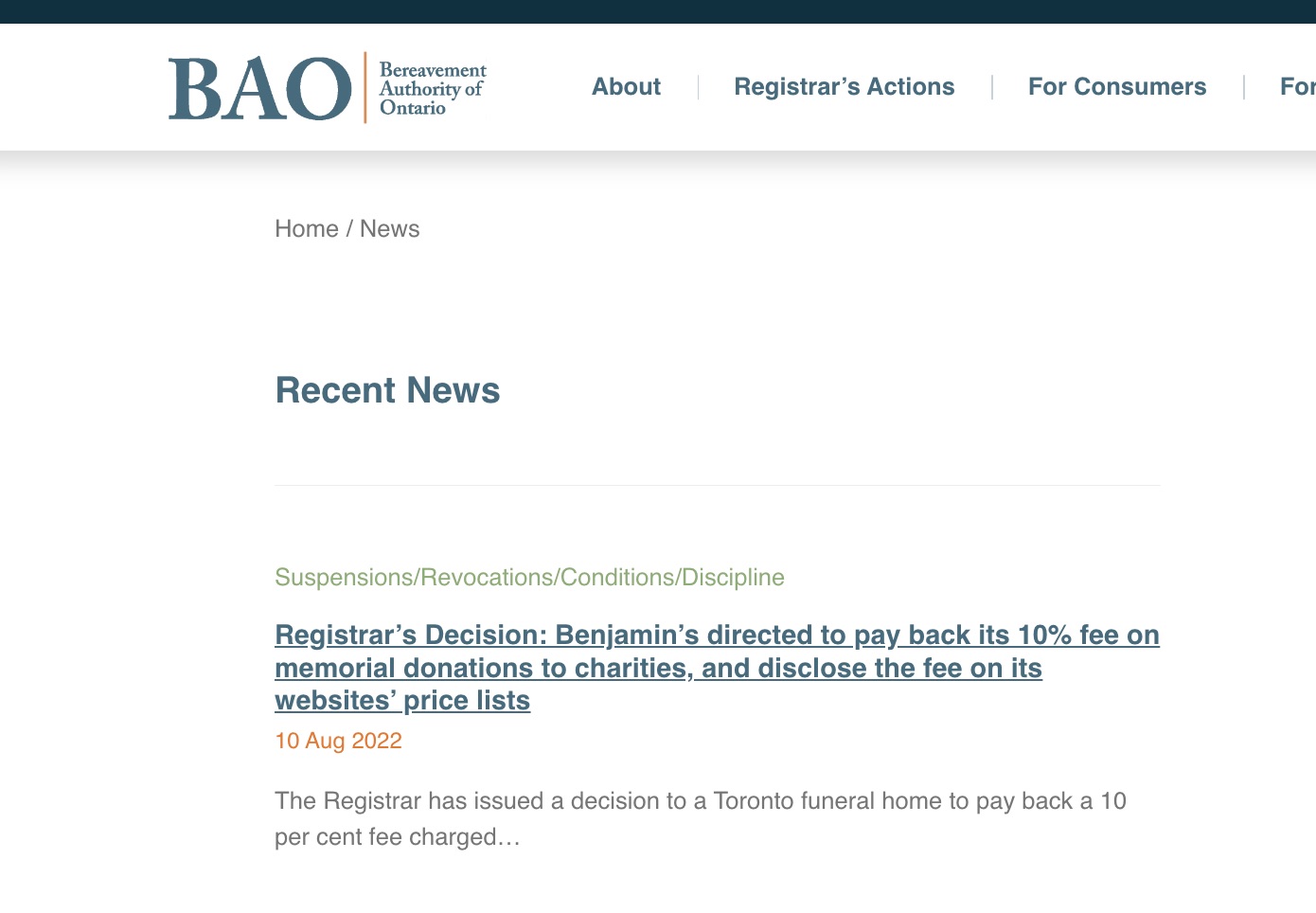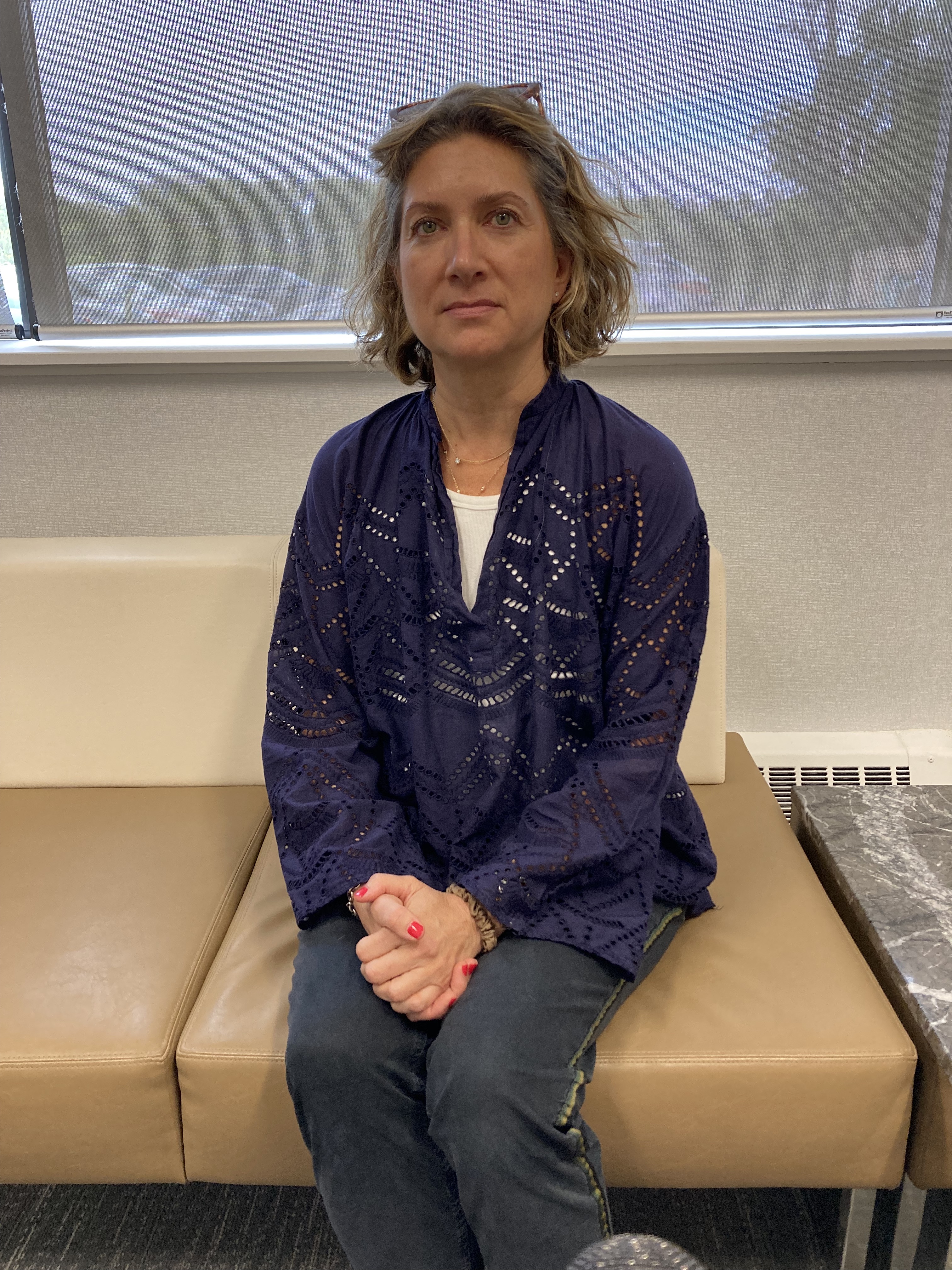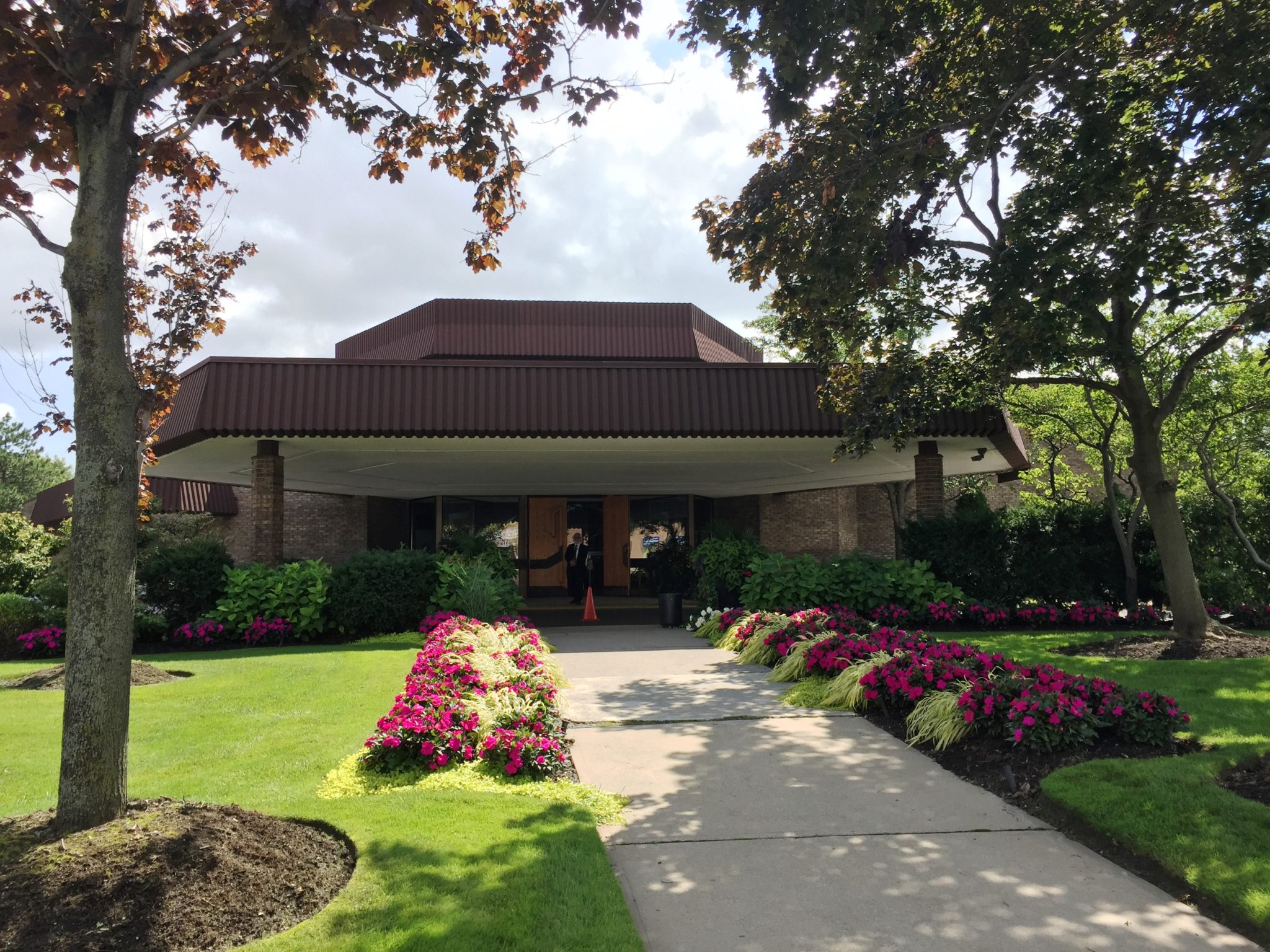It appears that public pressure, combined with the threat of sanctions from Ontario’s funeral industry licensing body, have pushed Benjamin’s, Toronto’s largest Jewish funeral home, to overhaul how it runs parts of its business.
Its managing director, Michael Benjamin, announced on Aug. 29 that his company has already started to make changes in response to growing calls for more transparency and revelations by The CJN about a series of investigations by the provincial funeral licensing body.
The CJN has learned that the Bereavement Authority of Ontario (BAO) has investigated at least five complaints about Benjamin’s business practices, including one dating back to 2015.
On Monday, Michael Benjamin said the changes range from modernizing his family’s Benjamin’s Park Memorial Chapel website to training staff at the Benjamin Foundation to better communicate with customers.
“We recognize there are concerns and have listened to the feedback,” Benjamin wrote in an email to The CJN.
Most significantly, Benjamin’s has temporarily suspended its controversial, decades-old practice of deducting 10 percent in administration fees to cover the costs of processing charitable memorial donations through its Benjamin Foundation.
Foundation fee to be refunded
The move comes four weeks after a grieving Toronto couple, Raziel and Jeanne Zisman, went public on The CJN Daily podcast about their battle with Benjamin’s after their son died.
The Zismans buried their only child, Liam, in January of 2022.
They are adamant that they weren’t specifically told at the time of the ZOOM call what would happen if they used the Benjamin Foundation charity to handle the charitable donations made in their son’s memory.
The Benjamin Foundation offers mourners a place to temporarily park the monies that come in, then works with the family to distribute the proceeds, at a later date. Since 2016, it has transferred over $2 million this way.
What the Zismans didn’t notice was a clause in the contract they signed, stating the Foundation office levies a 10 percent administration fee on all contributions. After the shiva ended, they were told about it by office staff when they asked for an accounting of the monies that had come in since the funeral.
Industry regulator weighs in
The Zismans launched a lawsuit against Benjamin’s in provincial court. They also complained to the BAO.
While the court case hasn’t been heard yet, in late July the BAO issued several rulings siding with the Zismans.
The BAO found that indeed, the couple was not informed before they signed the contract about the 10 percent fee, although Benjamin’s had plenty of opportunities to tell them.
The Benjamin Foundation was told it must put the money it deducted back into the Liam Jacob Zisman Memorial Fund, then transfer the funds immediately to the family’s designated charities, Chai Lifeline and Camp Quality.
It also ordered Benjamin’s to take immediate steps to comply with six directives, including being more transparent in how it operates this Foundation service, posting new price lists and making it clearer for donors on the website when they pay, about the existence of the 10 percent fee policy.
Under the provincial legislation that created the BAO in 2016, any of the 9,000 licensees that do not follow its regulations faces a range of sanctions.
The most serious consequences include conditions being placed on their licence, suspension of their licence and, in the most extreme situations, revocation of their business licence.
After Benjamin’s did not comply within five business days, the BAO issued further penalties.
Repay six years’ worth of fees: BAO
On Aug. 10, the BAO told the Jewish funeral home to go back into its records for the last six years and refund all the 10-percent fees it had kept on behalf of every customer who used the family-run Foundation.
That extra money is to be dispatched to the charities by the end of January 2023.
“We want their attention on it, and we want them to act in the interests of grieving families,” said David Brazeau, the BAO’s communications manager.
The broader directive could impact hundreds of Benjamin’s former clients who used the Foundation and potentially cost Benjamin’s more than $200,000 dollars to restore the administration fees it deducted from donations.
Benjamin’s has now filed an appeal of the BAO’s rulings in the Zisman case, even as it moves to repair the company’s image and bring in some of the agency’s required improvements.
Michael Benjamin, the Benjamin Foundation and the family’s Benjamin’s Park Memorial Chapel are asking the Superior Court of Ontario to quash the decisions.
They’ve applied for a judicial review, but in the meantime, they also want the court to halt the financial and regulatory penalties being imposed on their funeral business.

Among other issues, Benjamin’s lawyers argued that the BAO overstepped its legal boundaries and has no jurisdiction over the Benjamin Foundation. Also, they say the agency can’t possibly expect Michael Benjamin to personally pay out six figures or more in lost administration fees to countless charities.
“We are seeking judicial review for the simple reason that charities like the Foundation clearly and unequivocally do not fall under the jurisdiction of the BAO and are already regulated extensively and thoroughly under existing Canadian laws and regulations as well as the CRA (Canada Revenue Agency),” Benjamin told The CJN in an email.
“This unprecedented ruling could have far-reaching implications for all foundations.”
While Benjamin maintains the charitable foundation is an independent entity and is not part of its funeral services business, the BAO’s registrar, Carey Smith, felt that interpretation was stretching things.
In his July decisions, he found that Benjamin’s staff routinely discuss the option of using the associated charity Foundation when they make funeral arrangements with grieving families, and thus the Foundation should be considered in the same category as other services such as showing a casket, reviewing the obituary notice or hiring police escorts to the cemetery.
What Benjamin’s has committed to do
Although Benjamin’s action plan does not cover all of what it was ordered to do by the BAO, the funeral home feels its commitment to change will go a long way to better serving the Jewish community.
“As the chapel is a leader in the industry, and is marking 100 years of serving the community, it will be launching a complete review of all documents, processes, procedures and communications materials to implement additional ideas and strategies to improve the customer experience,” the email from Michael Benjamin reads.
“We are grateful to have the privilege of providing an essential service to Toronto’s Jewish community and will continue to work with all stakeholders with integrity and diligence.”
Toronto has three Jewish funeral homes, all are privately owned businesses. Benjamin’s and its affiliated company, lower-cost Hebrew Basic Burial, run two venues in the city; Steeles Memorial Chapel runs the third.
New complaints about COVID costs
The development comes amidst growing financial and regulatory problems for Benjamin’s.
Aside from the Zismans’ dispute, several recent cases have now come to light in which the funeral home was penalised for overcharging customers, including during the height of the pandemic.
On Aug. 23, the BAO revealed that they found the company had been charging higher or unexplained fees to bury people during the pandemic in 2020 and 2021.
Funeral homes were told they shouldn’t add a “special care fee” onto people’s bills during COVID merely to cover personal protective gear. If they did want to charge extra, there had to be a good reason, and they had to make it clear to the family before the contract was signed. The fee was not supposed to be levied on non-COVID deaths.
Most operators complied, according to the BAO, but a few, including Benjamin’s, charged the fee anyway.
A second complaint was lodged about transportation costs that were higher than the price list. That was also investigated.
The BAO and Benjamin’s settled on a combined remedy for both cases.
The funeral home refunded the money to all 258 families who were charged what the BAO called “inappropriate extra fees”.

The file was closed in April, with Benjamin’s paying $75,918 plus tax.
While the BAO normally doesn’t publish decisions that have been settled satisfactorily, it did so this time, in light of all the publicity surrounding the Zisman family’s battle with the funeral home.
Officials felt the general public should know about Benjamin’s track record and decided to ramp up the stakes.
“It just adds to pressure for any funeral establishment to rethink what it’s doing and do the right thing for grieving families,” said Brazeau.

Pallbearer fees not disclosed
The latest revelations about Benjamin’s and its related companies come as no surprise to Toronto lawyer Jordan Solway.
He was not one of the 258 families involved in the COVID overcharging case. His family had its own complaint.
In late July 2020, Solway’s mother, Annette, died unexpectedly. She was 80.
Because of COVID, all the initial arrangements with Benjamin’s were done over Zoom. It was a graveside service.
It was only weeks later that Solway noticed the bill included an item for Benjamin’s staff to act as the pallbearers for his mother’s casket.
The way Solway remembers it, he had been made to understand the service would be provided for free.
“I’m not objecting to the right as a provider to charge a fee. I don’t have any issue with that. It’s just the explanation of it to say, ‘We can do this, but there is a fee involved. Are you okay with it?’ That’s all you’re looking for, but that isn’t provided,” Solway said.
“And the feeling that both I had, and my brother had, was that you were just constantly being either up sold or incurring fees without proper transparency or disclosure.”
Aside from that, Solway says he never received the required detailed price breakdown before signing the contract. He also didn’t get the Consumer’s Guide, which Benjamin’s is supposed to provide by law.
Solway said the company gave it to the family only later, at the cemetery, on the day of his mother’s funeral on Aug. 5.
Solway complained to the BAO, and the BAO investigated.
On this file, the BAO found Benjamin’s breached the disclosure regulations. As part of the resolution with the Solway family, Benjamin’s agreed to waive $4,000 from the final bill.
Although their mother’s case happened two years ago, Solway felt he had to speak out now, after hearing the Zismans’ story.
“Normally, with my background as a lawyer, I would read a contract carefully from cover to cover,” he said. “But you don’t have the benefit of doing that, because in many cases you’re in shock. And that’s the last thing on your mind, that someone’s going to, in essence, take advantage of you and not explain things fully at a time when you’re most vulnerable.
“Frankly, you get more disclosure when you go in and you buy a car or you buy any other purchase where things are explained and understand the financial obligation you’re assuming. And you can make decisions at the end of the day.”

Hidden charges for tombstone
Suzanne Heft also reached out to The CJN about her own battle with Benjamin’s, although hers dates back seven years.
In 2015, Heft’s husband Harold died of brain cancer. He was 51 and left his wife and their two young children.
The funeral went smoothly, but months later, when it was time to order a gravestone, Suzanne made a surprising discovery. When she visited an independent local monument maker, she was told she had already paid hundreds of dollars towards the purchase of a Benjamin’s stone.
Sure enough, when Heft checked her bill, there was a $500 charge for a gravestone she had not ordered.
“If it hadn’t been for this very honest gentleman in this competitive business who alerted me to it, I might never have known,” said Heft, a fundraiser in Toronto. “So I was deeply upset by this. Deeply upset.”
She quickly contacted Benjamin’s and was told the charge was considered a credit towards the future purchase of a tombstone from the company’s affiliated monument business.
Heft’s money was refunded and she chose to buy the gravestone elsewhere.
“I realized that there would be many other people who would have a similar circumstance to mine and who would not know, and who might not even know how to go about requesting the refund, and all this money would be lost,” Heft said.
She, too, complained to the BAO about Benjamin’s doing “negative option-style” billing.
After a BAO investigation, Benjamin’s was found to have been selling advance tombstone credits costing $400 to about 35 percent of its customers at the time of signing a funeral contract.

The funeral company agreed to be more clear in its wording in the future, when telling customers they had actually purchased a Memorial Plan Card worth $400—the little laminated cards they got in their paperwork.
And Benjamin’s agreed to start sending out reminder notices to families at least four times in the two years after the shiva ends.
In its final report on the case, the BAO said Benjamin’s told them they had no reason to believe the staff were not following “normal business practises” and suggested it was mentioned at least four times when a family came to make arrangements for the funeral.
But Michael Benjamin’s vow this week to start doing things differently going forward, especially concerning the Benjamin Foundation, is of little comfort to Raziel Zisman and his wife.
Zisman, a Toronto mining industry consultant, is frustrated that Benjamin’s still won’t comply with the BAO order from July 28 to release the thousands of dollars in Liam’s memorial fund immediately, and send it to charity.
“Every penny donated in Liam’s name, 100 percent not just 10 percent, is still sitting in their bank account,” he told The CJN. “How do you explain that?”
Read more about The BAO’s recent investigations into Benjamin’s
Hear Raziel and Jeanne Zisman speak to The CJN Daily about their struggle with the funeral home
